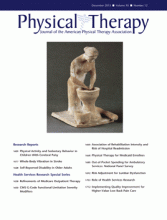Abstract
Background Measurement of function usually involves the use of both performance-based and self-report instruments. However, the relationship between both types of measures is not yet completely understood, in particular for older adults attending primary care.
Objective The main objective of the study was to investigate the association between the World Health Organization Disability Assessment Schedule 2.0 (WHODAS 2.0) and the Short Physical Performance Battery (SPPB) for older adults at primary care. A secondary objective was to determine the influence of sociodemographic and health-related variables on this relationship.
Design This was a cross-sectional study.
Methods A total of 504 participants aged 60 years and older from 18 different primary care centers underwent a one-session assessment including: sociodemographic variables, comorbidities, performance, self-reported disability, pain, depressive symptoms, and physical activity. Performance was assessed using the SPPB, and self-reported disability was assessed using the WHODAS 2.0.
Results The correlation between WHODAS 2.0 and SPPB scores was strong (r=.65). Regression analysis showed that the SPPB total score explained 41.7% of the variance in WHODAS 2.0 scores (adjusted R2=41.6%). A second model including the SPPB subtests (balance, gait, and sit-to-stand), depressive symptoms, number of pain sites, pain intensity, and level of physical activity explained 61.7% of the variance in WHODAS 2.0 scores (adjusted R2=60.4%). No model improvement was found when considering the 6 WHODAS 2.0 individual domains.
Limitations The cross-sectional nature of the study does not allow inferences on causal relationships.
Conclusions This study's findings confirm that self-report and performance-based measures relate to different aspects of functioning. Further study is needed to determine if primary care interventions targeting lower extremity performance and depressive symptoms improve self-reported disability.
Footnotes
Dr Silva, Dr Queirós, and Dr Rocha provided concept/idea/research design. All authors provided writing and data analysis. Dr Queirós provided data collection. Dr Silva provided project management, facilities/equipment, and institutional liaisons. Dr Silva and Dr Sa-Couto provided consultation (including review of manuscript before submission).
The authors thank all people from the Agrupamento de Centros de Saúde Baixo Vouga who directly or indirectly contributed to this work and the students who contributed to data collection.
The study received ethical approval from the Regional Health Administration Commission, Coimbra, Portugal.
Dr Sa-Couto's work was supported by Portuguese funds through the Center for Research and Development in Mathematics and Applications (CIDMA), University of Aveiro, and the Portuguese Foundation for Science and Technology (Fundação para a Ciência e a Tecnologia [FCT]) within project PEst-OE/MAT/UI4106/2014.
- Received July 29, 2014.
- Accepted May 19, 2015.












